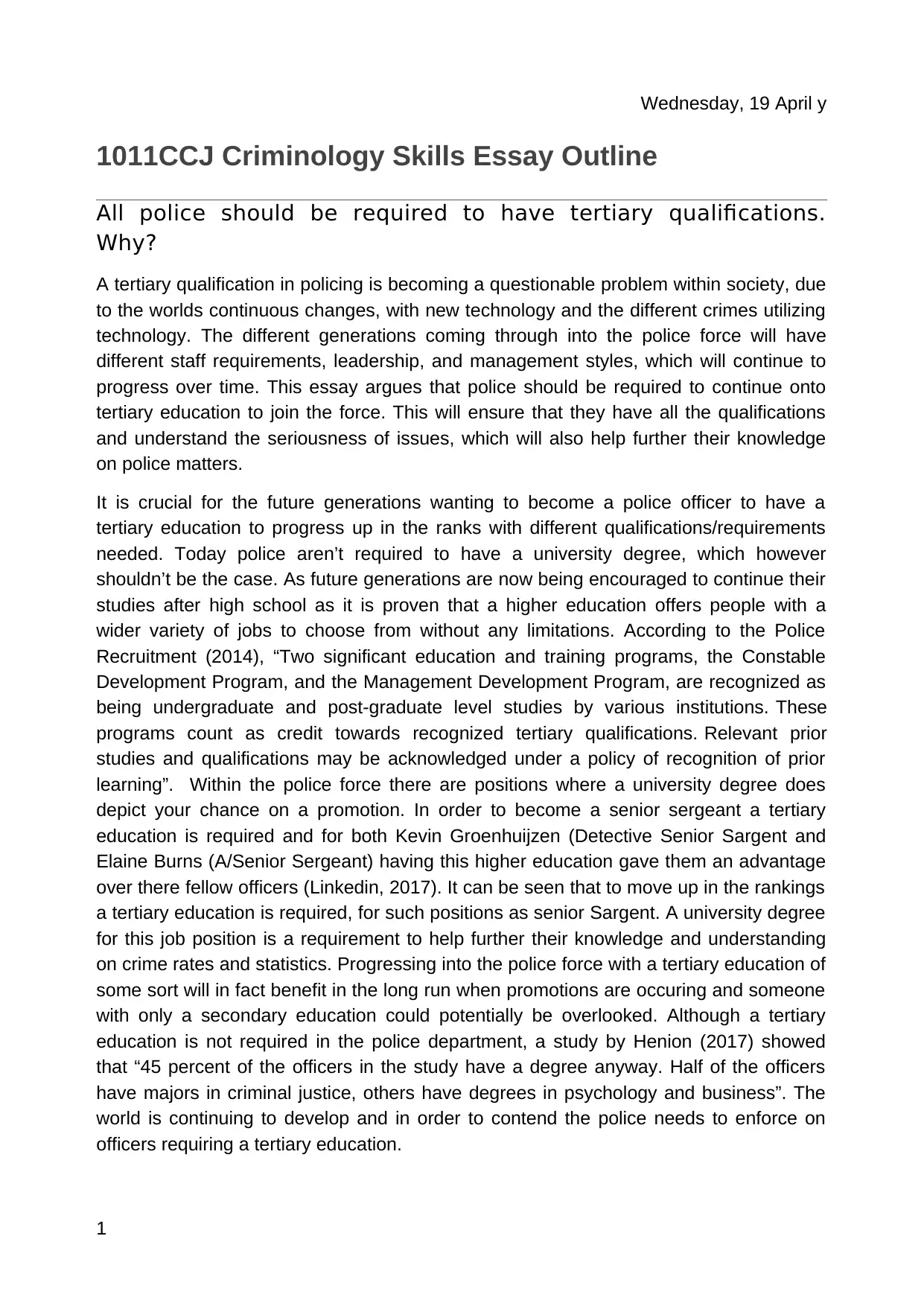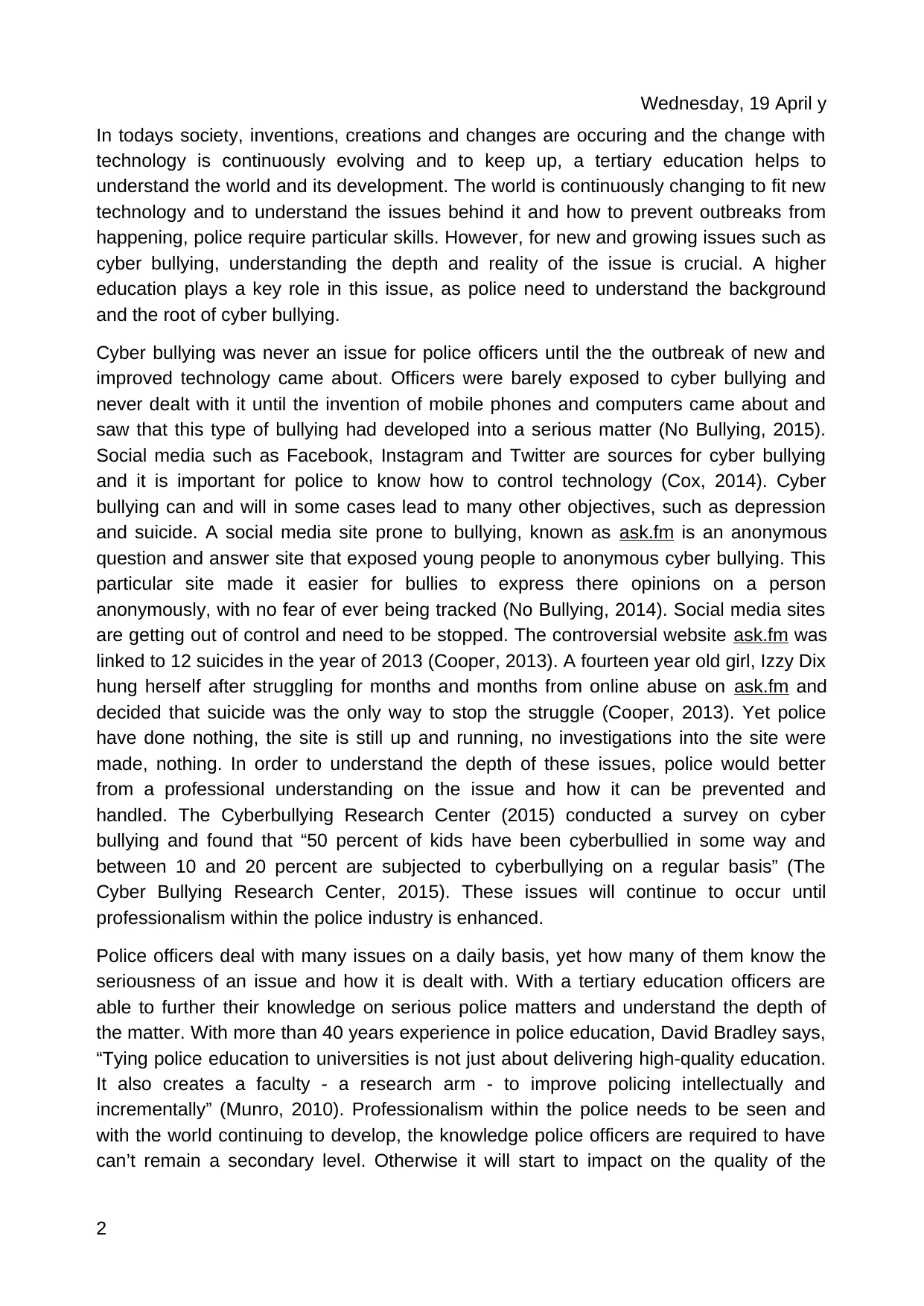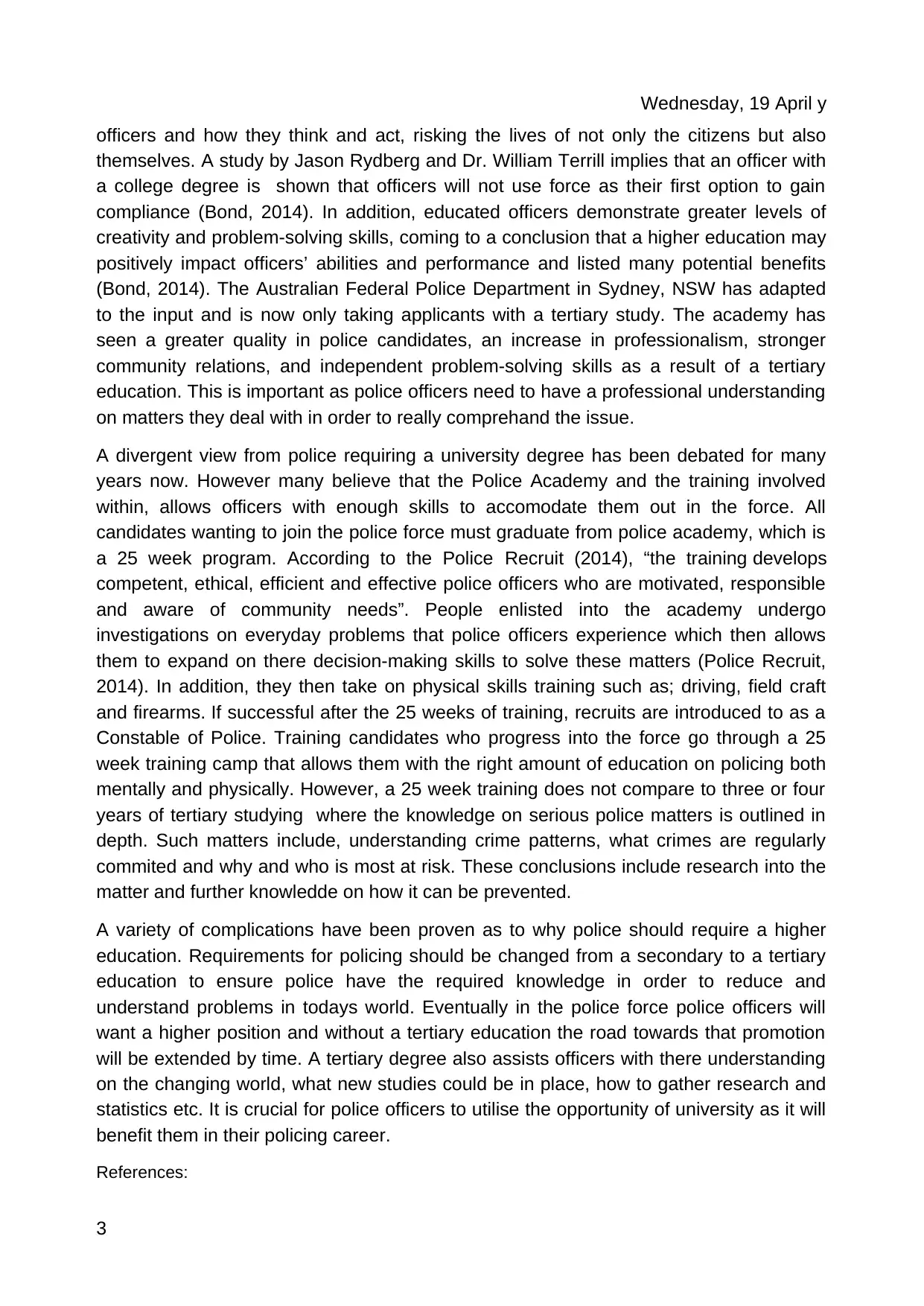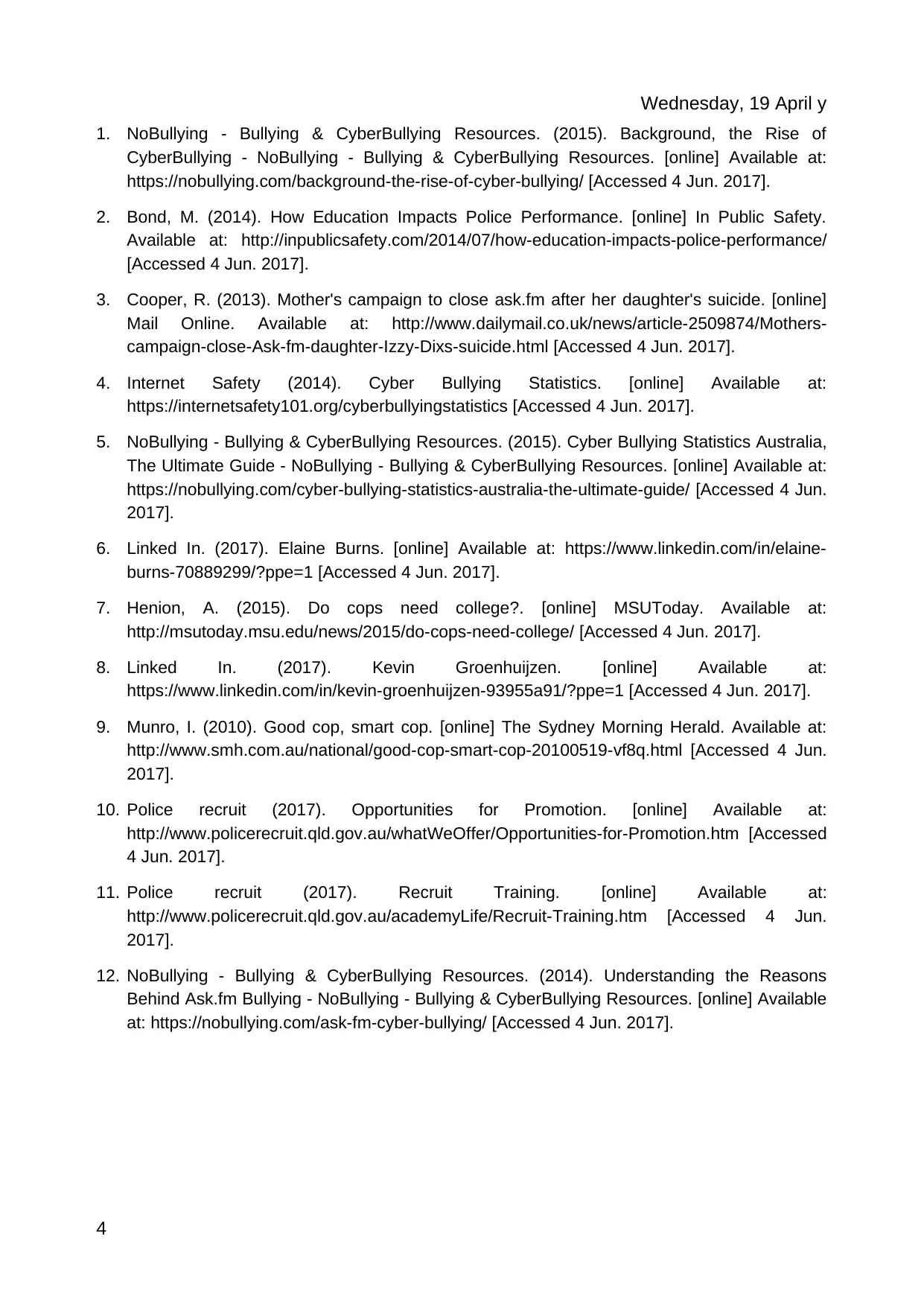The Necessity of Tertiary Qualifications for Police Officers: An Essay
VerifiedAdded on 2021/08/25
|4
|2122
|50
Essay
AI Summary
This essay argues that police officers should be required to possess tertiary qualifications, emphasizing the evolving nature of crime and technology. It highlights the benefits of higher education, including enhanced understanding of complex issues like cyberbullying, improved problem-solving skills, and increased professionalism. The essay references studies and examples, such as the Australian Federal Police's adoption of tertiary education requirements, to support its claims. It contrasts the depth of knowledge gained through a university education with the shorter training programs offered by police academies. The essay contends that tertiary education better prepares officers for promotions and equips them to navigate the complexities of modern policing, ultimately improving their ability to serve and protect the community effectively. The author uses multiple sources to support the arguments.

Wednesday, 19 April y
1011CCJ Criminology Skills Essay Outline
All police should be required to have tertiary qualifications.
Why?
A tertiary qualification in policing is becoming a questionable problem within society, due
to the worlds continuous changes, with new technology and the different crimes utilizing
technology. The different generations coming through into the police force will have
different staff requirements, leadership, and management styles, which will continue to
progress over time. This essay argues that police should be required to continue onto
tertiary education to join the force. This will ensure that they have all the qualifications
and understand the seriousness of issues, which will also help further their knowledge
on police matters.
It is crucial for the future generations wanting to become a police officer to have a
tertiary education to progress up in the ranks with different qualifications/requirements
needed. Today police aren’t required to have a university degree, which however
shouldn’t be the case. As future generations are now being encouraged to continue their
studies after high school as it is proven that a higher education offers people with a
wider variety of jobs to choose from without any limitations. According to the Police
Recruitment (2014), “Two significant education and training programs, the Constable
Development Program, and the Management Development Program, are recognized as
being undergraduate and post-graduate level studies by various institutions. These
programs count as credit towards recognized tertiary qualifications. Relevant prior
studies and qualifications may be acknowledged under a policy of recognition of prior
learning”. Within the police force there are positions where a university degree does
depict your chance on a promotion. In order to become a senior sergeant a tertiary
education is required and for both Kevin Groenhuijzen (Detective Senior Sargent and
Elaine Burns (A/Senior Sergeant) having this higher education gave them an advantage
over there fellow officers (Linkedin, 2017). It can be seen that to move up in the rankings
a tertiary education is required, for such positions as senior Sargent. A university degree
for this job position is a requirement to help further their knowledge and understanding
on crime rates and statistics. Progressing into the police force with a tertiary education of
some sort will in fact benefit in the long run when promotions are occuring and someone
with only a secondary education could potentially be overlooked. Although a tertiary
education is not required in the police department, a study by Henion (2017) showed
that “45 percent of the officers in the study have a degree anyway. Half of the officers
have majors in criminal justice, others have degrees in psychology and business”. The
world is continuing to develop and in order to contend the police needs to enforce on
officers requiring a tertiary education.
1
1011CCJ Criminology Skills Essay Outline
All police should be required to have tertiary qualifications.
Why?
A tertiary qualification in policing is becoming a questionable problem within society, due
to the worlds continuous changes, with new technology and the different crimes utilizing
technology. The different generations coming through into the police force will have
different staff requirements, leadership, and management styles, which will continue to
progress over time. This essay argues that police should be required to continue onto
tertiary education to join the force. This will ensure that they have all the qualifications
and understand the seriousness of issues, which will also help further their knowledge
on police matters.
It is crucial for the future generations wanting to become a police officer to have a
tertiary education to progress up in the ranks with different qualifications/requirements
needed. Today police aren’t required to have a university degree, which however
shouldn’t be the case. As future generations are now being encouraged to continue their
studies after high school as it is proven that a higher education offers people with a
wider variety of jobs to choose from without any limitations. According to the Police
Recruitment (2014), “Two significant education and training programs, the Constable
Development Program, and the Management Development Program, are recognized as
being undergraduate and post-graduate level studies by various institutions. These
programs count as credit towards recognized tertiary qualifications. Relevant prior
studies and qualifications may be acknowledged under a policy of recognition of prior
learning”. Within the police force there are positions where a university degree does
depict your chance on a promotion. In order to become a senior sergeant a tertiary
education is required and for both Kevin Groenhuijzen (Detective Senior Sargent and
Elaine Burns (A/Senior Sergeant) having this higher education gave them an advantage
over there fellow officers (Linkedin, 2017). It can be seen that to move up in the rankings
a tertiary education is required, for such positions as senior Sargent. A university degree
for this job position is a requirement to help further their knowledge and understanding
on crime rates and statistics. Progressing into the police force with a tertiary education of
some sort will in fact benefit in the long run when promotions are occuring and someone
with only a secondary education could potentially be overlooked. Although a tertiary
education is not required in the police department, a study by Henion (2017) showed
that “45 percent of the officers in the study have a degree anyway. Half of the officers
have majors in criminal justice, others have degrees in psychology and business”. The
world is continuing to develop and in order to contend the police needs to enforce on
officers requiring a tertiary education.
1
Paraphrase This Document
Need a fresh take? Get an instant paraphrase of this document with our AI Paraphraser

Wednesday, 19 April y
In todays society, inventions, creations and changes are occuring and the change with
technology is continuously evolving and to keep up, a tertiary education helps to
understand the world and its development. The world is continuously changing to fit new
technology and to understand the issues behind it and how to prevent outbreaks from
happening, police require particular skills. However, for new and growing issues such as
cyber bullying, understanding the depth and reality of the issue is crucial. A higher
education plays a key role in this issue, as police need to understand the background
and the root of cyber bullying.
Cyber bullying was never an issue for police officers until the the outbreak of new and
improved technology came about. Officers were barely exposed to cyber bullying and
never dealt with it until the invention of mobile phones and computers came about and
saw that this type of bullying had developed into a serious matter (No Bullying, 2015).
Social media such as Facebook, Instagram and Twitter are sources for cyber bullying
and it is important for police to know how to control technology (Cox, 2014). Cyber
bullying can and will in some cases lead to many other objectives, such as depression
and suicide. A social media site prone to bullying, known as ask.fm is an anonymous
question and answer site that exposed young people to anonymous cyber bullying. This
particular site made it easier for bullies to express there opinions on a person
anonymously, with no fear of ever being tracked (No Bullying, 2014). Social media sites
are getting out of control and need to be stopped. The controversial website ask.fm was
linked to 12 suicides in the year of 2013 (Cooper, 2013). A fourteen year old girl, Izzy Dix
hung herself after struggling for months and months from online abuse on ask.fm and
decided that suicide was the only way to stop the struggle (Cooper, 2013). Yet police
have done nothing, the site is still up and running, no investigations into the site were
made, nothing. In order to understand the depth of these issues, police would better
from a professional understanding on the issue and how it can be prevented and
handled. The Cyberbullying Research Center (2015) conducted a survey on cyber
bullying and found that “50 percent of kids have been cyberbullied in some way and
between 10 and 20 percent are subjected to cyberbullying on a regular basis” (The
Cyber Bullying Research Center, 2015). These issues will continue to occur until
professionalism within the police industry is enhanced.
Police officers deal with many issues on a daily basis, yet how many of them know the
seriousness of an issue and how it is dealt with. With a tertiary education officers are
able to further their knowledge on serious police matters and understand the depth of
the matter. With more than 40 years experience in police education, David Bradley says,
“Tying police education to universities is not just about delivering high-quality education.
It also creates a faculty - a research arm - to improve policing intellectually and
incrementally” (Munro, 2010). Professionalism within the police needs to be seen and
with the world continuing to develop, the knowledge police officers are required to have
can’t remain a secondary level. Otherwise it will start to impact on the quality of the
2
In todays society, inventions, creations and changes are occuring and the change with
technology is continuously evolving and to keep up, a tertiary education helps to
understand the world and its development. The world is continuously changing to fit new
technology and to understand the issues behind it and how to prevent outbreaks from
happening, police require particular skills. However, for new and growing issues such as
cyber bullying, understanding the depth and reality of the issue is crucial. A higher
education plays a key role in this issue, as police need to understand the background
and the root of cyber bullying.
Cyber bullying was never an issue for police officers until the the outbreak of new and
improved technology came about. Officers were barely exposed to cyber bullying and
never dealt with it until the invention of mobile phones and computers came about and
saw that this type of bullying had developed into a serious matter (No Bullying, 2015).
Social media such as Facebook, Instagram and Twitter are sources for cyber bullying
and it is important for police to know how to control technology (Cox, 2014). Cyber
bullying can and will in some cases lead to many other objectives, such as depression
and suicide. A social media site prone to bullying, known as ask.fm is an anonymous
question and answer site that exposed young people to anonymous cyber bullying. This
particular site made it easier for bullies to express there opinions on a person
anonymously, with no fear of ever being tracked (No Bullying, 2014). Social media sites
are getting out of control and need to be stopped. The controversial website ask.fm was
linked to 12 suicides in the year of 2013 (Cooper, 2013). A fourteen year old girl, Izzy Dix
hung herself after struggling for months and months from online abuse on ask.fm and
decided that suicide was the only way to stop the struggle (Cooper, 2013). Yet police
have done nothing, the site is still up and running, no investigations into the site were
made, nothing. In order to understand the depth of these issues, police would better
from a professional understanding on the issue and how it can be prevented and
handled. The Cyberbullying Research Center (2015) conducted a survey on cyber
bullying and found that “50 percent of kids have been cyberbullied in some way and
between 10 and 20 percent are subjected to cyberbullying on a regular basis” (The
Cyber Bullying Research Center, 2015). These issues will continue to occur until
professionalism within the police industry is enhanced.
Police officers deal with many issues on a daily basis, yet how many of them know the
seriousness of an issue and how it is dealt with. With a tertiary education officers are
able to further their knowledge on serious police matters and understand the depth of
the matter. With more than 40 years experience in police education, David Bradley says,
“Tying police education to universities is not just about delivering high-quality education.
It also creates a faculty - a research arm - to improve policing intellectually and
incrementally” (Munro, 2010). Professionalism within the police needs to be seen and
with the world continuing to develop, the knowledge police officers are required to have
can’t remain a secondary level. Otherwise it will start to impact on the quality of the
2

Wednesday, 19 April y
officers and how they think and act, risking the lives of not only the citizens but also
themselves. A study by Jason Rydberg and Dr. William Terrill implies that an officer with
a college degree is shown that officers will not use force as their first option to gain
compliance (Bond, 2014). In addition, educated officers demonstrate greater levels of
creativity and problem-solving skills, coming to a conclusion that a higher education may
positively impact officers’ abilities and performance and listed many potential benefits
(Bond, 2014). The Australian Federal Police Department in Sydney, NSW has adapted
to the input and is now only taking applicants with a tertiary study. The academy has
seen a greater quality in police candidates, an increase in professionalism, stronger
community relations, and independent problem-solving skills as a result of a tertiary
education. This is important as police officers need to have a professional understanding
on matters they deal with in order to really comprehand the issue.
A divergent view from police requiring a university degree has been debated for many
years now. However many believe that the Police Academy and the training involved
within, allows officers with enough skills to accomodate them out in the force. All
candidates wanting to join the police force must graduate from police academy, which is
a 25 week program. According to the Police Recruit (2014), “the training develops
competent, ethical, efficient and effective police officers who are motivated, responsible
and aware of community needs”. People enlisted into the academy undergo
investigations on everyday problems that police officers experience which then allows
them to expand on there decision-making skills to solve these matters (Police Recruit,
2014). In addition, they then take on physical skills training such as; driving, field craft
and firearms. If successful after the 25 weeks of training, recruits are introduced to as a
Constable of Police. Training candidates who progress into the force go through a 25
week training camp that allows them with the right amount of education on policing both
mentally and physically. However, a 25 week training does not compare to three or four
years of tertiary studying where the knowledge on serious police matters is outlined in
depth. Such matters include, understanding crime patterns, what crimes are regularly
commited and why and who is most at risk. These conclusions include research into the
matter and further knowledde on how it can be prevented.
A variety of complications have been proven as to why police should require a higher
education. Requirements for policing should be changed from a secondary to a tertiary
education to ensure police have the required knowledge in order to reduce and
understand problems in todays world. Eventually in the police force police officers will
want a higher position and without a tertiary education the road towards that promotion
will be extended by time. A tertiary degree also assists officers with there understanding
on the changing world, what new studies could be in place, how to gather research and
statistics etc. It is crucial for police officers to utilise the opportunity of university as it will
benefit them in their policing career.
References:
3
officers and how they think and act, risking the lives of not only the citizens but also
themselves. A study by Jason Rydberg and Dr. William Terrill implies that an officer with
a college degree is shown that officers will not use force as their first option to gain
compliance (Bond, 2014). In addition, educated officers demonstrate greater levels of
creativity and problem-solving skills, coming to a conclusion that a higher education may
positively impact officers’ abilities and performance and listed many potential benefits
(Bond, 2014). The Australian Federal Police Department in Sydney, NSW has adapted
to the input and is now only taking applicants with a tertiary study. The academy has
seen a greater quality in police candidates, an increase in professionalism, stronger
community relations, and independent problem-solving skills as a result of a tertiary
education. This is important as police officers need to have a professional understanding
on matters they deal with in order to really comprehand the issue.
A divergent view from police requiring a university degree has been debated for many
years now. However many believe that the Police Academy and the training involved
within, allows officers with enough skills to accomodate them out in the force. All
candidates wanting to join the police force must graduate from police academy, which is
a 25 week program. According to the Police Recruit (2014), “the training develops
competent, ethical, efficient and effective police officers who are motivated, responsible
and aware of community needs”. People enlisted into the academy undergo
investigations on everyday problems that police officers experience which then allows
them to expand on there decision-making skills to solve these matters (Police Recruit,
2014). In addition, they then take on physical skills training such as; driving, field craft
and firearms. If successful after the 25 weeks of training, recruits are introduced to as a
Constable of Police. Training candidates who progress into the force go through a 25
week training camp that allows them with the right amount of education on policing both
mentally and physically. However, a 25 week training does not compare to three or four
years of tertiary studying where the knowledge on serious police matters is outlined in
depth. Such matters include, understanding crime patterns, what crimes are regularly
commited and why and who is most at risk. These conclusions include research into the
matter and further knowledde on how it can be prevented.
A variety of complications have been proven as to why police should require a higher
education. Requirements for policing should be changed from a secondary to a tertiary
education to ensure police have the required knowledge in order to reduce and
understand problems in todays world. Eventually in the police force police officers will
want a higher position and without a tertiary education the road towards that promotion
will be extended by time. A tertiary degree also assists officers with there understanding
on the changing world, what new studies could be in place, how to gather research and
statistics etc. It is crucial for police officers to utilise the opportunity of university as it will
benefit them in their policing career.
References:
3
⊘ This is a preview!⊘
Do you want full access?
Subscribe today to unlock all pages.

Trusted by 1+ million students worldwide

Wednesday, 19 April y
1. NoBullying - Bullying & CyberBullying Resources. (2015). Background, the Rise of
CyberBullying - NoBullying - Bullying & CyberBullying Resources. [online] Available at:
https://nobullying.com/background-the-rise-of-cyber-bullying/ [Accessed 4 Jun. 2017].
2. Bond, M. (2014). How Education Impacts Police Performance. [online] In Public Safety.
Available at: http://inpublicsafety.com/2014/07/how-education-impacts-police-performance/
[Accessed 4 Jun. 2017].
3. Cooper, R. (2013). Mother's campaign to close ask.fm after her daughter's suicide. [online]
Mail Online. Available at: http://www.dailymail.co.uk/news/article-2509874/Mothers-
campaign-close-Ask-fm-daughter-Izzy-Dixs-suicide.html [Accessed 4 Jun. 2017].
4. Internet Safety (2014). Cyber Bullying Statistics. [online] Available at:
https://internetsafety101.org/cyberbullyingstatistics [Accessed 4 Jun. 2017].
5. NoBullying - Bullying & CyberBullying Resources. (2015). Cyber Bullying Statistics Australia,
The Ultimate Guide - NoBullying - Bullying & CyberBullying Resources. [online] Available at:
https://nobullying.com/cyber-bullying-statistics-australia-the-ultimate-guide/ [Accessed 4 Jun.
2017].
6. Linked In. (2017). Elaine Burns. [online] Available at: https://www.linkedin.com/in/elaine-
burns-70889299/?ppe=1 [Accessed 4 Jun. 2017].
7. Henion, A. (2015). Do cops need college?. [online] MSUToday. Available at:
http://msutoday.msu.edu/news/2015/do-cops-need-college/ [Accessed 4 Jun. 2017].
8. Linked In. (2017). Kevin Groenhuijzen. [online] Available at:
https://www.linkedin.com/in/kevin-groenhuijzen-93955a91/?ppe=1 [Accessed 4 Jun. 2017].
9. Munro, I. (2010). Good cop, smart cop. [online] The Sydney Morning Herald. Available at:
http://www.smh.com.au/national/good-cop-smart-cop-20100519-vf8q.html [Accessed 4 Jun.
2017].
10. Police recruit (2017). Opportunities for Promotion. [online] Available at:
http://www.policerecruit.qld.gov.au/whatWeOffer/Opportunities-for-Promotion.htm [Accessed
4 Jun. 2017].
11. Police recruit (2017). Recruit Training. [online] Available at:
http://www.policerecruit.qld.gov.au/academyLife/Recruit-Training.htm [Accessed 4 Jun.
2017].
12. NoBullying - Bullying & CyberBullying Resources. (2014). Understanding the Reasons
Behind Ask.fm Bullying - NoBullying - Bullying & CyberBullying Resources. [online] Available
at: https://nobullying.com/ask-fm-cyber-bullying/ [Accessed 4 Jun. 2017].
4
1. NoBullying - Bullying & CyberBullying Resources. (2015). Background, the Rise of
CyberBullying - NoBullying - Bullying & CyberBullying Resources. [online] Available at:
https://nobullying.com/background-the-rise-of-cyber-bullying/ [Accessed 4 Jun. 2017].
2. Bond, M. (2014). How Education Impacts Police Performance. [online] In Public Safety.
Available at: http://inpublicsafety.com/2014/07/how-education-impacts-police-performance/
[Accessed 4 Jun. 2017].
3. Cooper, R. (2013). Mother's campaign to close ask.fm after her daughter's suicide. [online]
Mail Online. Available at: http://www.dailymail.co.uk/news/article-2509874/Mothers-
campaign-close-Ask-fm-daughter-Izzy-Dixs-suicide.html [Accessed 4 Jun. 2017].
4. Internet Safety (2014). Cyber Bullying Statistics. [online] Available at:
https://internetsafety101.org/cyberbullyingstatistics [Accessed 4 Jun. 2017].
5. NoBullying - Bullying & CyberBullying Resources. (2015). Cyber Bullying Statistics Australia,
The Ultimate Guide - NoBullying - Bullying & CyberBullying Resources. [online] Available at:
https://nobullying.com/cyber-bullying-statistics-australia-the-ultimate-guide/ [Accessed 4 Jun.
2017].
6. Linked In. (2017). Elaine Burns. [online] Available at: https://www.linkedin.com/in/elaine-
burns-70889299/?ppe=1 [Accessed 4 Jun. 2017].
7. Henion, A. (2015). Do cops need college?. [online] MSUToday. Available at:
http://msutoday.msu.edu/news/2015/do-cops-need-college/ [Accessed 4 Jun. 2017].
8. Linked In. (2017). Kevin Groenhuijzen. [online] Available at:
https://www.linkedin.com/in/kevin-groenhuijzen-93955a91/?ppe=1 [Accessed 4 Jun. 2017].
9. Munro, I. (2010). Good cop, smart cop. [online] The Sydney Morning Herald. Available at:
http://www.smh.com.au/national/good-cop-smart-cop-20100519-vf8q.html [Accessed 4 Jun.
2017].
10. Police recruit (2017). Opportunities for Promotion. [online] Available at:
http://www.policerecruit.qld.gov.au/whatWeOffer/Opportunities-for-Promotion.htm [Accessed
4 Jun. 2017].
11. Police recruit (2017). Recruit Training. [online] Available at:
http://www.policerecruit.qld.gov.au/academyLife/Recruit-Training.htm [Accessed 4 Jun.
2017].
12. NoBullying - Bullying & CyberBullying Resources. (2014). Understanding the Reasons
Behind Ask.fm Bullying - NoBullying - Bullying & CyberBullying Resources. [online] Available
at: https://nobullying.com/ask-fm-cyber-bullying/ [Accessed 4 Jun. 2017].
4
1 out of 4
Related Documents
Your All-in-One AI-Powered Toolkit for Academic Success.
+13062052269
info@desklib.com
Available 24*7 on WhatsApp / Email
![[object Object]](/_next/static/media/star-bottom.7253800d.svg)
Unlock your academic potential
Copyright © 2020–2026 A2Z Services. All Rights Reserved. Developed and managed by ZUCOL.




